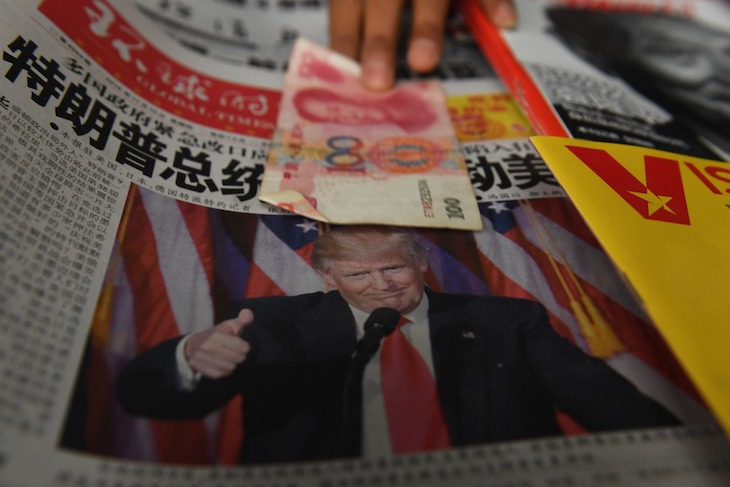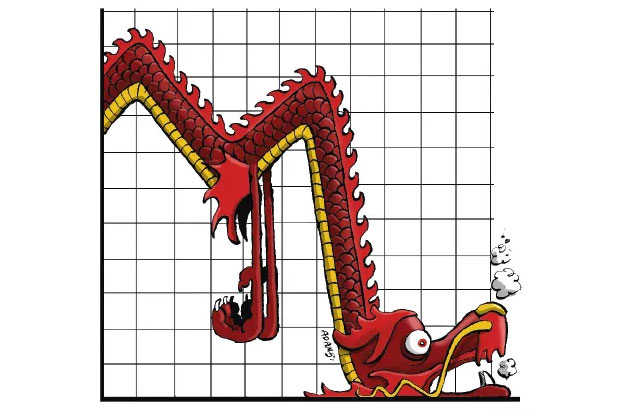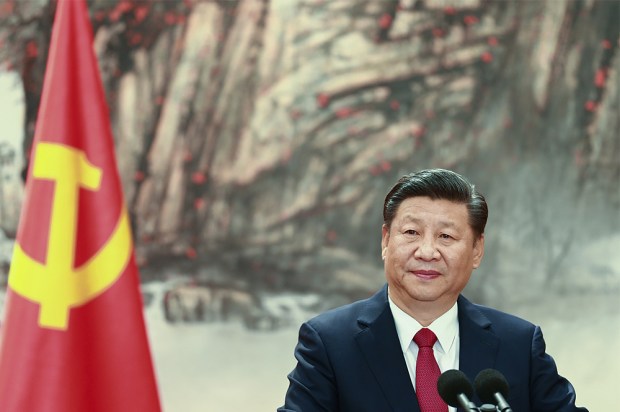‘Stocks plunge as China hits US goods with tariffs,’ said a headline after the long weekend, and the FTSE100 duly dipped below 7,000. But I wonder what a serious trade war would look like — and how markets would respond if the White House and Beijing took the gloves off. Last year, China exported $500 billion worth of goods to the US, while US exports to China amounted to $135 billion. Last month, President Trump announced import tariffs on $50 billion worth of Chinese steel and aluminium, 10 per cent of the total import bill. China has hit back with tariffs on US steel tubes plus an eclectic product list ranging from aluminium scrap to frozen pork liver, adding up to $3 billion — which, to quote Humphrey Bogart, ‘don’t amount to a hill of beans in this crazy world’.
The truth is that Trump’s first move was a shallow bid for adulation from benighted blue-collar supporters — and every wise head in Washington told him it was stupid. China’s response is token tit-for-tat, from a regime that clearly has a more intelligent overview of the benefits of global trade. Collateral losers so far include American farmers and scrap dealers, denizens of Trump’s heartland just as much as the steel workers he claimed to be defending. As for the US stock market, the one factor that should have spooked it in the first place was last year’s coronation of Trump, but during his first 12 months in office, investors showed precisely the opposite reaction; now they are beginning to realise how much damage to their interests he’s capable of causing.
Remember Poitiers
The French do trade skirmishes better. Back in 1982, France was flooded with cheap Japanese videocassette recorders, until a rule was imposed requiring all such imports to be processed through a small customs office in Poitiers, hundreds of miles from any port, where inspectors felt it necessary to open every box to check that the operating instructions were in French. Despite vehement complaints to Brussels and the then world trade regulator, Gatt, the flood was reduced from 64,000 VCRs per month to less than 10,000, and the Japanese company Victor was strong-armed into a joint venture with a French state company to manufacture VCRs in France. It was a lesson in applying ruthless focus, not pointless gesture.
Cheminot bashing
The French also run better railways, and those of us who look forward to travelling on the SNCF network this summer must wait to see whether Emmanuel Macron wins his battle with les cheminots — the railway workers whose privileges (early retirement, free travel, subsidised housing) he aims to abolish, and whose unions are militantly opposed to other Macron proposals that might lead to competition or any part-privatisation. Their two-days-out-of-five strike launched this week — coinciding with action by Air France workers and dustmen — is unlikely to shake the French President’s determination to advance his reform agenda for the country’s economy. But it may rapidly erode public support for confrontation with the railway workers. Opinion polling so far is closely divided, and union leaders take every opportunity to recall the climbdown by the Chirac-Juppé government in 1995 after a wave of strikes in opposition to changes in public-sector retirement ages.
Meanwhile, what our own media have taken to calling ‘Macron’s Thatcher moment’ is also instructive for collectors of obscure French vocabulary. For the right, it’s a symbolic battle against la gréviculture, the endemic penchant for strikes that barely exists anywhere else in the developed world these days; but for the left, it’s merely another outburst of le cheminot bashing.
Cream for the alley cat
The victory of Melrose Industries in its hostile bid for GKN is, in effect, the passage of an underperforming British business into the hands of a more potent set of British managers, whose quest to extract shareholder value will be tempered by ‘binding commitments’ — extracted at the last moment by Business Secretary Greg Clark — to maintain R&D spending and not to sell GKN’s aerospace division for at least five years. It is a result that offers a better future for GKN’s product specialisms and skilled workers than the alternative, which was to stumble on under an ancien régime who within the same timespan might well have driven the company into the arms of an acquirer with a less impressive track record, or simply into oblivion.
So the outrage at the result, much of it politically confected and fuelled by references in BBC bulletins to Melrose as ‘asset-strippers’, was frankly silly. And it distracted attention from another takeover this week — in which an entrepreneurial British business passed into foreign hands without so much as a murmur of doubt or disapproval.
This was the sale to CME, better known as the Chicago Mercantile Exchange, of Nex, which is the electronic trading business that’s the successor to the Icap money-broking empire built by Michael Spencer. The price was a very rich $5.5 billion, and when completed, the deal will net £670 million for the former Tory treasurer Spencer, whose admirers and detractors alike will recognise
a description of him quoted in the FT as ‘nimble, like an alley cat’.
I’ve known Spencer for 30 years, and don’t begrudge him this lucrative finale to a rollercoaster career. But I suspect too much has been made of the pledge by CME, as a condition of the deal, to make London its European headquarters — offering ‘proof of the City’s attractiveness to foreign investors post-Brexit’. Will that last as long as Melrose’s pledges on GKN? I wonder. And if Nex is an example of London’s cutting edge in fashionable ‘fintech’, why must it find a US owner to secure its future? The currently leaderless London Stock Exchange might have been an obvious bidder, but was nowhere to be seen.
Got something to add? Join the discussion and comment below.
Get 10 issues for just $10
Subscribe to The Spectator Australia today for the next 10 magazine issues, plus full online access, for just $10.
You might disagree with half of it, but you’ll enjoy reading all of it. Try your first month for free, then just $2 a week for the remainder of your first year.















Comments
Don't miss out
Join the conversation with other Spectator Australia readers. Subscribe to leave a comment.
SUBSCRIBEAlready a subscriber? Log in